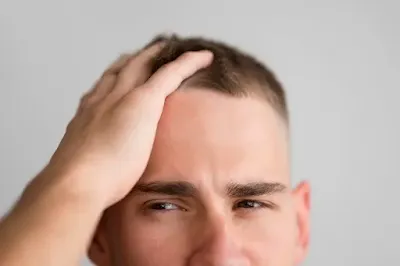Dihydrotestosterone (DHT) is a potent androgen hormone derived from testosterone. It plays a crucial role in the development of male characteristics and overall health. While high levels of DHT are often associated with conditions like hair loss and prostate issues, low levels of DHT can also have significant effects on the body. This article explores what happens when DHT levels are low, the causes, and potential implications for health.
 |
| Understanding Low DHT Levels and Their Effects Image provided by Freepik. |
The Role of DHT in the Body
DHT is an androgen, a hormone responsible for the development of male traits. It is produced from testosterone by the enzyme 5-alpha-reductase. DHT is more potent than testosterone and binds more strongly to androgen receptors. It is critical for:
1. Development of Male Characteristics: DHT is essential for the development of primary and secondary male sexual characteristics, such as a deeper voice, facial hair, and increased muscle mass.
2. Prostate Health: DHT contributes to the growth and function of the prostate gland.
3. Sexual Function: It plays a role in maintaining libido and sexual function in men.
4. Hair Growth and Skin Health: DHT influences the growth cycle of hair and the production of sebum in the skin.
Causes of Low DHT Levels
Low DHT levels can occur due to several factors, including:
1. Genetic Conditions: Conditions like 5-alpha-reductase deficiency or androgen insensitivity syndrome can lead to reduced DHT production or activity.
2. Hormonal Imbalances: Low testosterone levels can result in reduced conversion to DHT.
3. Medications: Certain medications, particularly 5-alpha-reductase inhibitors used to treat conditions like benign prostatic hyperplasia (BPH) and hair loss, can lower DHT levels.
4. Age: As men age, natural declines in testosterone and DHT levels can occur.
Effects of Low DHT Levels
1. Delayed or Incomplete Puberty
- In males, low DHT levels can lead to delayed or incomplete puberty, resulting in underdeveloped secondary sexual characteristics such as reduced facial and body hair, a less deepened voice, and smaller genitalia.
2. Impaired Sexual Development and Function
- Low DHT levels can lead to underdeveloped sexual organs and reduced sexual function. In severe cases, it may result in ambiguous genitalia or failure to develop typical male characteristics.
3. Reduced Libido and Erectile Dysfunction
- DHT plays a role in maintaining libido. Low levels can contribute to decreased sexual desire and erectile dysfunction.
4. Decreased Muscle Mass and Strength
- DHT contributes to muscle development and strength. Low levels may result in reduced muscle mass and physical performance.
5. Altered Hair Growth Patterns
- While high DHT levels are associated with hair loss, low levels can lead to other hair growth issues. For example, men may experience reduced facial and body hair growth.
6. Impact on Mood and Cognitive Function
- Hormonal imbalances, including low DHT, can affect mood and cognitive function, potentially leading to symptoms like fatigue, depression, and difficulty concentrating.
7. Bone Health
- Androgens, including DHT, play a role in maintaining bone density. Low levels can increase the risk of osteoporosis and fractures.
8. Diagnosis and Management of Low DHT Levels
If low DHT levels are suspected, a healthcare provider may perform blood tests to measure hormone levels, including testosterone and DHT. Treatment depends on the underlying cause and may include:
1. Hormone Replacement Therapy (HRT)
- Testosterone replacement therapy can help restore normal levels of testosterone and DHT, improving symptoms.
2. Medications
- In cases where low DHT is due to medications like 5-alpha-reductase inhibitors, adjusting the dosage or switching medications may be considered.
3. Lifestyle Changes
- Regular exercise, a balanced diet, and stress management can support overall hormonal health.
4. Monitoring and Follow-Up
- Regular monitoring of hormone levels and symptoms is essential to adjust treatment as needed and prevent complications.
- Conclusion
Low DHT levels can have various effects on the body, impacting sexual development, physical appearance, mood, and overall health. Understanding the causes and consequences of low DHT is crucial for appropriate diagnosis and treatment. If you suspect low DHT levels, it is important to consult with a healthcare provider for a thorough evaluation and personalized management plan.